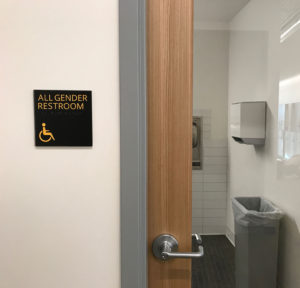In a society where a single inappropriate online post has the potential to break apart a college application and the consumer information one provides to a website can be sold for money, being aware of the uses and dangers of digital data is becoming ever more critical.
For example, people express themselves in a multitude of ways over social media, so college admissions officers have begun to look at some applicant’s social media accounts to get a better understanding of their character. Because colleges have so many applicants, admissions officers do not have time to look at everyone’s social media, so further research about an applicant through their social media is usually reserved for applicants who are on the edge for acceptance.
The Lick-Wilmerding admissions team, which sorts through hundreds of applications each year, has made a conscious decision not to look at an applicant’s social media. “We have never visited applicants’ social media accounts,” says Cristal Ogletree, director of Lick-Wilmerding Admissions. “[Social media] doesn’t seem feasible to require or review for all applicants. It’s never been part of our process, and we don’t plan to add applicant social media review in the future.”
However, according to a Kaplan Test Prep telephone questionnaire, thirty-one percent of admissions officers at colleges have looked at an applicant’s social media. As people share more and more of their daily life on social media, searching for one’s presence on the Internet is “becoming more ubiquitous and less looked down upon” in the admissions process according to a New York Times interview with Christine Brown, a director at Kaplan Test Prep.
Thirty percent of admissions officers say they have denied an application based on the information they found online. So it’s vital that what officers are finding online is accurate information. Officers could falsely identify a student’s social media account leading to unfair treatment. Admissions officers are often not required to give a reason for a denied application, so a student would not be able to disprove any suspect online posts.
Due to the margin of error that could ruin an applicant’s prospects, colleges such as the University of Vermont have explicitly chosen to not use any aspect of their applicant’s social media in their admissions process. Other colleges like Colgate University check social media. However, if Colgate finds anything troubling, they will contact the student to clarify what they saw, providing students an opportunity to dispute potential false claims.
As applicants for universities across the country and world, Lick students have a considerable stake in the college admissions process. In a survey of sixteen Lick seniors, 37.5 percent believed that colleges might look at their social media. Only one student out of the sixteen said they had changed or deleted aspects of their social media to appear as a better applicant to colleges. Many of them mentioned the fact that since their social media profiles are private, colleges couldn’t look at their social media if they even if they wanted to do so.

A digital footprint is a trace of nearly everything one does on the Internet, from calls, emails, comments, and texts to even simple searches. Websites and companies track one’s data through cookies, record-keeping agreed to through the terms of service, location services, and enabling access to other accounts. Most of the digital footprint–websites you visit, direct messages, Internet searches, and emails–is beneath the surface, not accessible to the general public.
Large companies and websites, however, can track, record, and make money off people’s digital footprint and the data one leaves behind. Websites can sell that data to larger organizations such as Acxiom, a massive data broker. Acxiom buys small pieces of data from websites, compiles, cleans it, and then organizes it to form a profile of a specific person. In 2018, Acxiom boasted a database of 2.5 billion people, with 10,000 attributes for each person. Acxiom then sells these profiles to various groups ranging from advertising agencies to insurance companies.
One’s Google search about candidates tells Acxiom one’s political preference. Signing up for a mailing list for a brand-name fashion website will tell Acxiom your gender, potential socioeconomic class, and age. These small bits of data build up as companies like Acxiom purchase mailing lists, viewer counts, and shopping trends from websites.
Data brokering, or selling data, is legal in all fifty states. Vermont is the only state to impose restrictions, requiring data brokers to register themselves as brokers, alerting consumers of potential data breaches, to whom brokers sell data, and if a person can opt-out of their information being collected.
Capitalizing on the trend of selling data, Wibson is an organization that wants to shake up the current state of data brokering. Wibson allows users to control which companies receive their data and what information they give, and in the process users make money from the use of their data. Users fill out surveys and allow companies access to certain aspects of their life, from their Facebook biography to their Apple health app information. In exchange, users receive WIB tokens, which can be turned into currency when the user wants to redeem them. Wibson has an interestingly transparent method in data collecting in an otherwise mysterious data brokerage process.
A more widely known, yet massive data broker, is Facebook. In 2018, this social media giant was caught up in a scandal that brought their data sharing to light. A New York Times investigation found that Facebook allowed several big-name companies access to various pieces of their users’ private information. Facebook didn’t sell this data but instead exchanged it with other companies and used it to further their own platform. Facebook allowed Sony, Microsoft, and Amazon to see users’ email addresses while Netflix and Spotify could see users’ direct messages. The NYT reported that one thing for which Facebook had exchanged their data was a contact list of Amazon accounts.
The digital footprint is becoming increasingly significant in our society as data gains an academic, commercial, and monetary value. And as data brokerage and the viewing of an applicant’s social media picks up steam, online privacy is slowly starting to become a thing of the past.






